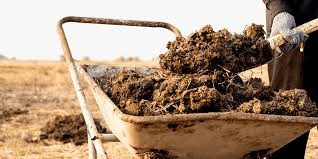Hello farmers and gardeners today we are here with a great information of the difference between manure and fertilizers. To increase agriculture, produce, the farmers work on improving the fertility of the soil, which is possible by adding both manure and fertilizer.
When several crops are grown one after the other, it decreases the productivity of the soil. Though, this can be overcome by adding manures and fertilizers to the soil.
This increases the yield of the plants and restores the productivity of the soil. Thus, manures and fertilizers are paramount for efficient crop production.
Like most organisms, plants need a variety of nutrients in order to grow properly. These elements are normally present in the soil. When they are not, the plants suffer.
Fertilizers were created to make up any soil deficiencies so that things can be grown in less than ideal spaces. However, the main nutrients found in fertilizer are nitrogen (N), phosphorus (P) and potassium (K).
They’re generally listed on labels in that order as well.
Of course your plants don’t know the difference between synthetic and organic fertilizers but you will, particularly in the long run which is why understanding the major difference between manure and fertilizers as a crop farmer is very neccessary.

Synthetic fertilizers are known to degrade the quality of soil over time. You constantly need more to improve your garden. Synthetic fertilizers also contain salts. These compounds not only make the soil more acidic, they keep beneficial earthworms away.
Regular watering of your plants can even move the nutrients in these compounds far enough from the plant roots that they won’t do any good. In addition, synthetic fertilizers are often made from non-renewable resources.

On the other hand, organic fertilizers improve garden soil where they are used. They not only assist with water retention, they also make the soil lighter so that more air is available to the plant roots.
Organic fertilizers don’t waste nutrients like their chemical counterparts. Nor are they likely to create a build-up of salts that could dampen plant growth.
These types of fertilizers even tend to be less likely to burn tender plant roots than synthetic products.
The slow working nature of organic fertilizers is beneficial if you’re looking to improve your garden soil over time. This aspect can nonetheless be a downside if you’re looking for instant results. (A good organic compromise when your plants need a sudden energy boost is liquid fertilizers or foliar sprays.)
Gardeners should also be aware that organic fertilizers are biologically active.
This means that their components can change over time and may slightly vary with each batch.
You do need to be careful when it comes to purchasing fertilizer. Those products stating they are ‘organic’ at first glance might not actually be. Make sure you read product labels carefully
Read Also: Complete List and Importance of Chemical Fertilizers for Crops
Now, let us get into the details of Difference Between Manure and Fertilizers.
A Step by Step Flow to Difference Between Manure and Fertilizers

Manure refers to the natural substance that is obtained from the decomposition of the waste of plants and animals such as cow dung, piggery, goats, fish meal, etc.
The different sources of manure are given below:
• Cattle dung, urine, and slurry from biogas plants.
• Droppings of goat and sheep, piggery and poultry
• Waste from the slaughterhouses such as bones, meat, and hoof meal
• By-products of agricultural industries and fish waste
• Crop waste
• Weeds, water hyacinth
On the other hand, FERTILIZER is the chemical substances which can be added to the soil to raise its nutrient content.
If you are planning for farming, you must know about the ways to enhance the fertility of the soil and fertilizer is a synthetic substance or an inorganic compound.
Read Also: Management Functions of Buffer Zones
The Differences Between Manure and Fertilizers

The difference between manure and fertilizers include the following below:
• Manure can be described as an organic material prepared by decomposition of crop residue or animal excreta, which can be added to the soil to improve its fertility. Unlike, fertilizer is described as any substance (organic or inorganic), that is added to the soil, therefore, increase the yield of crops.
• As manure is generated out of the decayed plant and animal waste, it gives humus to the soil, which increases the water-holding capacity of the soil. Unlike, fertilizer does not give humus to the soil.
• The manure is mainly prepared in the field, by dumping the animal and plant waste in open pits, to decompose it. Conversely, fertilizers are formed in factories through the chemical procedure.
• Manure is not as rich as fertilizers in terms of plant nutrients, as fertilizers are rich in plant nutrients.
• As manure is insoluble in water and it is slowly absorbed by the soil. On the other hand, fertilizers obtain easily dissolved in water, and that is why it is used by the plants immediately.
• Manure is economical, as it can be prepared by farmers themselves, fertilizers are industrially manufactured chemical; it is costly.
• Manure does not cause any harm to the soil; actually, it raises the quality of the soil in the long run. In contrast, the use of fertilizer in excess can decrease the effectiveness of the soil, and it causes harm to the organism present in the soil.
Read Also: Time and Methods of Fertilizer Application on Crops
Frequently Asked Questions
We will update this section soon.


I am happy for that and then i want to be an agrariant
Smiles… Glad the information was useful to you
Thanks for help
Glad we could help
Glad I could help